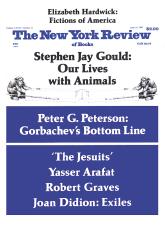The Joint Congressional Committee on the Iran-contra affair recently met Robert W. Owen, who had carried money to the contras for Lieutenant Colonel Oliver North, with the chill welcome of a grant of immunity for his sins; and after several days of testimony it bade him farewell with effusive tenders of praise for his virtues.
He had proved once more that nothing works so well to seduce a charlatan as a powerful dose of charlatanry. The way to bemuse congressmen is to stifle their critical faculties with the incenses of piety, which is, of course, the very art congressmen employ to bemuse the rest of us. Owen exercised its devices with skills so masterful that, after a while, his disarmed inquisitors had progressed from complimenting his candor to testifying to his idealism.
Any man can be excused for serving the convenience of the hour by passing himself off as an idealist; but it seemed rather a pity that Owen’s perceptions of his necessities had pressed him to cheat detached observers of the appreciation due the cynicism that is his saving grace.
The committee was provided with an impressive display of Owen’s virtues as a cynic in the exhibits culled from his reports to Lieutenant Colonel North on his missionary voyages to the contra front. He had filed them when Oliver North was telling the national security adviser that the flames of rebellion were sweeping toward Managua; and, possessed as he was by this vision, North must have paid small attention to these accounts of the dour reality.
The committee gave them smaller attention still; it preferred, as Washington invariably does, the warmed-over sermons of the preacher to the cold findings of the explorer. Owen had come to the contras solidly grounded in covert warfare’s abiding credo that scoundrelism is the final resort of the patriot. He showed the requisite tolerance in his negotiations with an agent he called Flacko, who proposed establishing himself as “the one who handles all financial support for the Miskitos.”
He and his buddy Tieador [would] then have an opportunity to make a little on the side.
But being a scoundrel is not, by itself, a strength guaranteeing purposeful performance; and, within a few months, Owen had so lost faith in this instrument that he informed North that Flacko had withdrawn to New Orleans to work “on new scams.” He could be dispensed with; there were all too many active scams in the field. Owen struggled to assemble legions with kidney enough to revive the southern front.
Contra headquarters had chosen Leonel Poveda to command the resurgence; and Owen passed on an assessment of the anointed and his subordinate officers of liberation so unsparing as to be possibly unjust:
Leonel Poveda: Rumored to have been involved with the sale of goods and pocketing certain “commissions.”
Chepon: Potential involvement with drug running and the sales of goods provided by the United States Government.
Carlos Coronel: Talks with all sides, potentially too much with the Sandinistas, and is making $ on the side.
These are just some of the people that Adolfo Calero [the FDN’s overall chief] should be wary about.
But then, he had found, all parties were already wary of every other. By the spring of 1986, Owen was cabling North:
The reality is that there are few of the so-called leaders of the movement who really care about the boys in the field. The war has become a business to many of them. There is still a belief that the marines are going to have to invade, so let’s get set so we will be the ones automatically put into power.
If the $100 million is approved and things go on as they have for the last five years, it will be like pouring money down a sinkhole.
Robert Owen had traveled to the despairing suspicion that things would go on and on just as they had. North, we may feel assured, did not notice. He was an idealist. And the congressmen took scrupulous care not to notice either. They hastened instead to exult in the discovery, however misapprehended, of another of those idealists who are so much more soothing company than the man who has found out the true conditions of life. That is what Owen had really been, determined as he now was to forget the truth he had discovered.
This Issue
June 25, 1987



